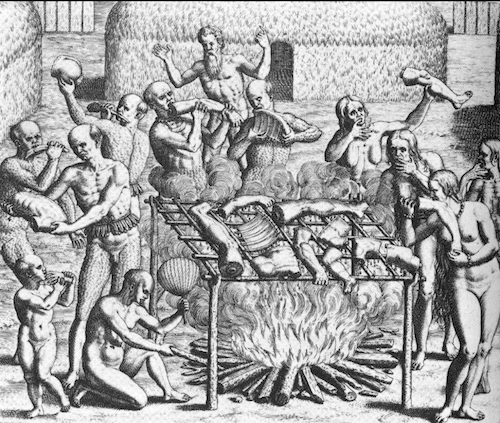
In Filipino folklore, the Awsang is a mythical demonic creature that provokes fear in those who believe in their existence.
The Awsang are notorious for their predilection for wanting to eat infants. They are often depicted as a half-human/half-beast creature with vampire-like characteristics. Ever heard of an Awsang? Just seeing a drawing of it based on Filipino folk stories, is enough to give me the chills. Various Philippine Island accounts state that although the Awsang is human during the daytime, it can transform into a rabid looking animal, such as a dog or predatory bird, etc. An Awsang, literally, looks like an overgrown “bat out of hell.”
Grimm, the popular supernatural TV show, recently ran an episode titled “Mommy Dearest,” which featured Portland’s Filipino community. The plot revolved around Filipino folklore of a creature known as an “Aswang” who was trying to eat a baby in order to extend its own life. Naturally, I was curious how the storyline would play out. It’s not every day that much attention is paid to my ancestral culture in mainstream Western entertainment.
The basic plot synopsis for this episode features plenty of authentic conversations in Tagalog. It revolves around a young Filipino couple, Dana and her husband Sam, who are expecting a baby. When Sam goes out to pick up prenatal vitamins, Dana takes a nap, only to be attacked by a scary looking creature— the Aswang. As it turns out, the Aswang is actually her mother in law, Lonnie, who is dying and needs to eat her oldest son’s firstborn in order to live. Otherwise, grandmother-to-be only has a month left to live. No wonder the grandmother is relentless. She even travels secretly from the Philippines to Portland in hopes of feasting on her unborn grandchild.
Sergeant Wu, a friend of the couple, responds to the 9-1-1 call by Dana’s neighbor, who rushes to her aid after hearing her screaming. Dana’s attack triggers Wu’s childhood memories about tales of the Awsang. As he keeps an eye on Dana, Wu starts having nightmares and begins suspecting Sam of trying to harm his wife and attempting to cover it up as a supernatural event. Wu is unaware that the Awsang, in this case, is real, which leads him to eventually question his sanity.
The challenge when depicting the folklore of other cultures by Western scriptwriters, is because of the social impact of TV shows, such as Grimm. Popular shows, in particular, have great influence on viewers who are unfamiliar with the culture portrayed. Sadly, this information sometimes doesn’t always educate, but rather gives fuel to discrimination.
I know this all too well. During my childhood, a common myth was that dogs were consumed in certain Asian countries. During WWII many people were so close to dying of starvation that they did consume domesticated animals. However, when a news story isolated the Philippines with this survival practice, my culturally insensitive classmates relentlessly tormented the children of Filipino immigrants, in Alberta, about putting dogs in danger. Worse things were said which does not bear repeating.
As I watched the plot on Grimm unfold , I felt a combination of horror and disgust. Not at the frightening image of the Aswang creature, but rather the depiction of Filipino culture in the episode which portrayed Filipino grandmothers as being prone to infant cannibalism. Furthermore, the episode represented the Filipino community as speakers of either broken English, or exhibiting extreme gender roles in marriage, and Fil-Am character, Officer Lee, as an emotionally fragile man who is so haunted by his grandmother’s tale of the Awsang in childhood that he has to check himself into a mental hospital. It also encourages the stereotype of Asian-American men as utterly lacking in masculine traits, being at the mercy of their domineering mothers. Sorry, this kind of mother-son dynamic happens in various cultures, not just Asian ones.
After watching the “Mommy Dearest” episode , I wanted to post on the Grimm fan forum that:
1. No, my grandmother never wanted to eat me while I was in utereo.
2. The longevity of my grandmother has nothing to do with infant cannibalism.
3. I speak English with a standard American accent, but have been known to do a pretty good British one.
Furthermore, my grandmothers were both well-educated women who didn’t encourage their grandkids to be so superstitious.
Why all the ruckus in my reaction? Perhaps it’s my personal bias, derived from my own personal history. During my childhood, I did not grow up in an international cosmopolitan metropolitan city like San Francisco, London or New York. While my hometown, in the Canadian Rockies, is more multicultural now, it was not during my formative years. My family and I were one of the first wave of Asian immigrants into the Canadian Rockies during the early 1980’s. While the Canadian cities of Vancouver, Toronto, and Montreal were more diverse in their immigrant population, the rest of the country not so much.
What drew my parents to Alberta was the oil boom of the early 1980’s in the region. My father was an engineer, so it made sense. Unfortunately, what I encountered was the grim reality of ignorance. People called me “chink” on a daily basis. They couldn’t even be accurate in their prejudice.
Even adults, such as some of my teachers, called me a “boat person” which referenced Vietnamese refugees who arrived, in boats, on the West Coast during the 80’s, seeking sanctuary in Canada and the US. There were boys who shoved me into the snow at recess even though I was just walking around on my own. Their justification was that it was because I was Indian looking. Again, they couldn’t be correct in labeling the object of their discrimination.
Between the Calgary Stampede and oil industry culture of the city, I definitely looked out of place. My experiences with this discrimination early in life is the reason why I’m a big fan of martial arts. Bullying seems to stop when I am no longer a target because my mindset and body language is the opposite of cowering in fear.
Ironically, when people were correct about my ethnicity, and had some knowledge about my culture, it only gave them ammunition to harass me. When I was in the fifth grade, the young cowboys and cowgirls who comprised my classmates accused me of:
1. The rather ridiculous accusation of not deserving a dog because we, supposedly, eat dogs in the Philippines. (
Let me repeat, during WWII, people in Asia and Europe often ate domesticated companion animals if there was nothing else left to eat. So that includes bunny rabbits too. Starvation is really unpleasant.) People who know me would never dare say that to me now. I’ve been writing about dogs in need of rescue for years and sharing pet articles on social media to help them get adopted—all for no pay. I buy steak for my dog just because I love him.2. Being a nanny who should be home tending the crops (Not all Filipino women are nannies. Some are engineers, physicians, chemists, and lawyers).
I once had career aspirations of becoming an economist.3.
Wanting to enroll in nursing school after high school because that’s what people “from your part of the world” do. Really? Go tell that to Nicole Scherzinger, Cheryl Burke, Robert Lopez (the first Filipino-American to win an Academy Award for Best Original Song 2014 after composing, “Let It Go” for the film “Frozen,” Cheryl Diaz Meyer (2004 Pulitzer Prize Winner), and Tani Cantil-Sakauye (Chief Justice of California).4. Not being capable of speaking and writing fluent English (and I probably didn’t write this essay I just submitted very well either). Believe it or not a teacher accused me of not speaking correct English. (She could have verified first what my first language was and what I spoke at home, which was English. Besides, my kindergarten teachers were British and I loved trying to mimic their accents from age four to five.)
5. Not speaking English like “
we” white people. See paragraph above. Clearly the cowkids were assuming a lot before speaking. We all know what assuming makes one look like.
All of these memories flooded back when I watched the Grimm episode. The impact of the storyline, which trivialized Filipinos and Filipino folklore, was the perfect material to have bullies in elementary through high school watch, to torment their Asian-American targets at school. I can only imagine what comments they will come up with. That is the power of the media when it comes to showcasing any foreign culture, not just mine.
So what could have Grimm’s scriptwriters done differently? At the risk of being called “too PC,” this is what I think they could have done with the plot instead:
1.Not made the
grandmother the Aswang.2. Not connect infant cannibalism with extended life among grandmothers.
3. Explain that the Awsang are cursed people, like Werewolves, who
transform during certain times of the year.
4.
Replace the Awsang with the Filipino Wesens (German word for demons, which is often used in the series), who tend to show up around pregnant women.5. Explain that the Awsang
wound up in Portland because of an artifact that was sent to the city for an exhibit. (Thereby, easily flowing into the episode after “Mommy Dearest.”)6.
Make Sergeant Wu a more fully developed character,not just a caricature of what the scriptwriters think a Filipino-American man is like. Better yet, why not have Officer Wu be a Detective, who consults with an expert on Filipino folklore in order to solve the case. Have such expert played by Mark Dacascos.7. Not made Dana, the pregnant Filipino lady in the episode, so demur to the point of stereotyping her with such lame lines as, “he is taking good care of me.” Instead, give her some depth and some spunky intelligence, and/or cast a Vanessa Hudgens or Shay Mitchell from Pretty Little Liars, in the Dana role.
8. Eliminate the Grandmother as the shape shifter completely.
Cast the role, accurately, and present the Filipino grandmothers as a vital woman in her late 40’s. They do not look like octogenarians, with kids in their 20’s expecting their first child. Nor are they frumpy women in a smock telling scary stories. My grandmothers were more like Steve McQueen’s first wife, Neile Adams, whose real-life grandson plays Jeremy Gilbert on The Vampire Diaries.
Ironically, the actor Reggie Lee, who plays Sergeant Wu, is Filipino-American and helped create this episode. He missed a pivotal opportunity to educate those interested in Filipino folklore and cultural anthropology in general about Filipino culture. Unfortunately, it seems, Lee’s efforts went askew, just like the Awsang’s efforts to continue living by consuming its unborn grandkid. Luckily, the episode ended with Dana and Sam being able to save their baby.
Love elephant and want to go steady?
Sign up for our (curated) daily and weekly newsletters!
Editorial Assistant: Ashleigh Hitchcock/Editor: Travis May
Photo: Wikipedia






Read 0 comments and reply